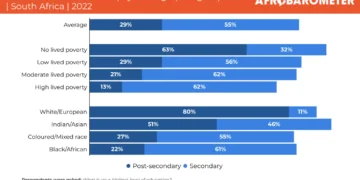In my years of experience as a professional English teacher, I have observed that many students have difficulty understanding the correct prepositions to use in their grammatical expressions. Prepositions, as a word class in the language, require thorough study of their usage in well-edited books and reputable dictionaries as references in order to effectively apply them in verbal and written communication. In addition to my recommendation, below are common errors related to education and schooling, along with trendy example sentences for quick learning purposes.
“A graduate of English” versus “A graduate in English”
The act of conferring degrees upon university graduates upon successful completion of requirements does not automatically classify them as graduates of the courses they studied. After conducting research on whether the preposition “of” is appropriate from various online sources, I was surprised to learn that it is not. The correct preposition is “in”.
Study the expressions below:
“I am a graduate of English,” Uche said. (Incorrect)
“I am a graduate in English,” Uche said. (Correct)
The professor should be able to answer the questions since he is a graduate of mathematics. (Incorrect)
The professor should be able to answer the questions since he is a graduate in mathematics. (Correct)
As a graduate of economics, Feranmi’s dream is to be a professor in the faculty of management sciences. (Incorrect)
As a graduate in economics, Feranmi’s dream is to be a professor in the faculty of management sciences. (Correct)
Should a Course be Offered?
One of the important questions I asked after consulting several authoritative dictionaries was to determine if ‘offer’ could be used in place of ‘take’ or ‘do’ for a course by students, especially university undergraduates and postgraduates. Unfortunately, none of them agreed with the errors popularized by expressions such as: “Ade, how many courses did you offer last semester?”
A US-based Nigerian humorously stated that he could see the shocked expression on his lecturer’s face after saying that he decided to offer a course with the question “Are you the university?” He was surprised because nobody had ever corrected the expression before he left Nigeria.
According to the Free Dictionary, “take” in the context of a course means “to enroll in, attend, and work towards completion of an academic course” as in “I took a course in the evenings to learn how to speak Japanese” and “She is taking a course in macroeconomics that sounds really interesting.”
Further research indicates that “do a course” is preferred by the Brits, as written in the Cambridge Dictionary, which many believe is strongly influenced by American English.
It is crucial to mention that only institutions “offer” courses, not students. In other words, courses are made available for enrollment after accreditation by regulatory bodies. For instance, the University of Lagos offers over 100 courses for new UTME applicants. Another example from the Oxford Advanced Learner’s Dictionary: My company offers a lot of in-house training courses.
Consider the following sentences:
The students could not graduate because they were expected to take at least 50 courses.
Most of the Nigerian universities accredited by the NUC offer international relations.
In School or At School?
Use “at” when referring to being physically present in the school, while “in” should be used when referring to being enrolled in school.
Kola: Segun, where are you?
Segun: I am at school. Would you like to join me anytime soon?
A student at a university or A student of a university?
The boy who won the competition is a student at Covenant University.(Correct)
The boy who won the competition is a student of Covenant University. (Incorrect)
We are students at the University of Leeds. (Correct)
We are students of the University of Leeds. (Incorrect)
In a nutshell, “at” should be used when indicating your studentship at a particular institution, not “of”. Using the incorrect preposition is a grave error!
______________________ Samuel Tolulope Alimi is the founder and lead scholar at English TV, an online platform dedicated to teaching the English language on various social media platforms. He earned a BA (Ed) from the prestigious Olabisi Onabanjo University, Ogun State, where he majored in English and Education. As a Grammar Columnist at Peoples Daily newspaper, one of the foremost and trusted national newspapers, he writes about Nigerian English on Page 23 of every Saturday's publication, with his column titled "Common Errors in English with Samuel Alimi." His writings have attracted considerable readership across several states, with over 30 detailed articles published. Samuel is a goal-oriented ambassador of Scholarship IQ, promoting its mission to build the world's largest African student directory in two local governments in Nasarawa State, Nigeria. He has also gained hands-on experience in ghostwriting autobiographies, community service, and research through his internship at SO41 Educational Consultancy, Ogun State. LinkedIn: Samuel Tolulope Alimi samueltolulopealimi@gmail.com






































































 EduTimes Africa, a product of Education Times Africa, is a magazine publication that aims to lend its support to close the yawning gap in Africa's educational development.
EduTimes Africa, a product of Education Times Africa, is a magazine publication that aims to lend its support to close the yawning gap in Africa's educational development.

